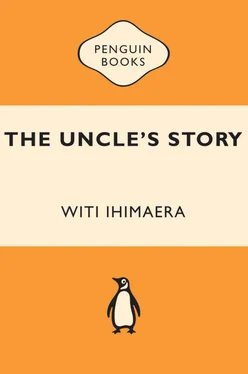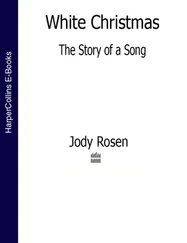George’s wedding. The dancehall, 1971. Patty was drunk and giggling because she had played a trick on Cliff and run to the bandleader and told him, ‘Get Cliff up to do a song for us.’ And Cliff had been positively fabulous, singing ‘Heartbreak Hotel’ just like Elvis. And Patty knew that she loved him, had loved him ever since he had stepped down from the bus, ever since she had seen him at the river, ever since the beginning of Time. And she screamed herself hoarse as Cliff scorched the hall with his number.
Auntie Pat’s eyes were wide and staring. ‘Then the song was over, and I saw Cliff running out the door with Sam, and I remembered that they were going home that night, back to the farm. I yelled above the crowd, ‘Cliff, don’t go!’ I wanted to tell him to stay. I wanted to tell him I loved him.’
And Patty couldn’t let Cliff leave just like that. She pushed through the crowd to the doorway. Where had Cliff and Sam gone? She saw them stumbling down to the rental car and, next moment, they had fallen. ‘Cliff! Cliff! Don’t go, Cliff!’ She ran after them and heard them laughing. And she too was laughing with happiness that she had caught up with Cliff, and then —
Auntie Pat turned to me. She touched her lips.
‘And then I saw you kiss him, Sam.’
Her voice was hushed, almost with awe.
‘I saw you kiss each other and I didn’t know what to think … I didn’t know that men would do that, kiss like that … and Cliff saw me and later, he must have realised I was the one who …’
‘Who did what, Auntie?’
And all of a sudden, Patty was vomiting. She ran back to the dining hall. Daddy was there. He asked her, ‘What’s wrong with you, Patty? What’s wrong?’
‘I told Daddy, Sam,’ Auntie Pat’s voice was small, plaintive. ‘I told him I saw you kissing Cliff. You should have told me the truth, Sam. If you had told me the truth about you and Cliff I would never have fallen in love with him. Or become so angry as to tell Daddy.’
I remembered the last words in Uncle Sam’s diary.
May God have mercy.
‘So who was it who wrote those words, Auntie? Was it Uncle Sam?’
‘Of course it wasn’t.’
‘You did, didn’t you?’
‘Yes.’
4
It took me until five in the morning to calm Auntie Pat down and to help her find her way back to the present. When she did, it was like watching somebody newly arisen from a morning sea.
‘Yes, Auntie Pat,’ I said, ‘it’s done. It’s over.’
‘I’ve been carrying the guilt all my life,’ she answered. ‘I’m glad you know everything.’
‘You have to forgive yourself. You weren’t to blame. You can put the past behind you now and get on with life. And I need you.’
‘Need me?’
‘This is just the beginning, Auntie. There are other Sams to fight for. I’ll need your feistiness, your fighting sprit.’
I watched as Auntie Pat’s back stiffened and her head went up to look at the far horizon.
‘Okay, Nephew,’ she said, spitting on her hands. ‘Just put me in the front row. You’ll hear all about it if you don’t put me in the front —’
Roimata was right. Auntie Pat was going to make a good kuia for our new gay tribe.
When I returned to the marae, the Southern Cross was turning just above the meeting house like a pinwheel. The meeting house had become its axis, determining the revolving of the world and stars. Roimata was sleeping next to Waka’s casket. Some of the kids from Wellington had crawled into her arms.
‘Yes, Roimata, you will make a fine mother for this great new tribe of ours. Your children will be as numerous — twins, triplets, whatever. Pity you couldn’t have chosen a better father.’
I went to find Carlos in the meeting house. He was by himself, watching the stars spilling over the brim of the night.
‘Keep your hands to your sides and don’t move,’ I said.
I stood behind him and slipped my arms under his shirt and around his chest. He shivered at their coldness.
The sky started to streak with the dawn.
‘Hey,’ Carlos said, ‘It’s going to be a great day —’
I felt Tunui a te Ika leap with expectancy against my heart. A good place from which to do battle.
A good day to begin battle from.
My mind went back to Cliff Harper when we were saying goodbye to each other at Los Angeles Airport. I was at the jetway, boarding my flight. He was at the other end of the terminal, walking away. He looked so lonely.
In despair, I called down the concourse. ‘Mr Harper!’
He turned to look at me. I didn’t know what to do next. Then I heard music surging like the sea, music filled with timelessness. The retreating sound of hunting horns. Two lovers taking the reckless chance to be together. Clattering down through the music, a huge chopper came through the roof. The helicopter hovered, its rotors slicing the sun.
‘This is from Sam!’ I called.
My voice echoed and echoed along the concourse. It seemed to open gateways in Time. People stopped, looked at me, curious.
I pointed at Harper. You .
I pointed at my heart. Me.
I made the thumbs up sign. Love you .
I stood tall. Saluted to him.
Cliff Harper seemed to crumple. Then he straightened. His hand snapped up as he returned my salute.
He turned and walked away.
In the roar of aircraft taking off and landing, in the sound of a helicopter suddenly jumping into the sky, I watched Cliff Harper until he was gone.
And the sun was there, bursting across the horizon.
I thought of Uncle Sam and his great love story. I made him a promise.
Uncle Sam, it is time to construct the world again, but a brave new world. Your story will become part of it and I will tell it until the whole world knows it.
I make my promise, Uncle Sam, to bind the new world’s top and bottom with light. I will tell your story to everyone I meet, whether they want to hear it or not. I will tell them how you loved a man and how wonderful that love was. With that love I will bind the outer framework of the world with the inner framework.
I have realised, Uncle Sam, that the telling of our stories will bring a location and a history to the world that we build. We who are gay and lesbian must fix the stories with firmness and solder their knots with purpose so that they become part of the narratives — the foundations, walls and roof — all peoples tell about each other. We must speak our stories, we must enact them, we must sing our songs throughout this hostile universe. We must bring a new promise to life and a new music to the impulse of history.
Tuia i runga, tuia i raro.
Tuia i roto, tuia i waho.
Tuia i te here tangata ka rongo te Ao
Ka rongo te Po.
Tuia. Tuia
Tuia.
No, Uncle Sam, not eternal darkness.
This book has been in my mind since 1986. However, it wasn’t until 1 October 1999 that it began life as Brangäne’s Warning . It was completed as The Uncle’s Story on 3 July 2000. Just prior to beginning the novel the New Zealand Air Force and New Zealand Army must have been on joint manoeuvres at the military airbase at Hobsonville. All I know is that in September I kept hearing thunder in the sky: the sounds of military helicopters morning and evening coming down Auckland Harbour and over the house I live in on the harbour. The sound was a powerful stimulus to my imagination. In particular, it brought back memories of Maori relatives and friends who had died in the Vietnam conflict and, also, of two events in Washington DC, where I lived in 1987–1990, stationed at the New Zealand Embassy: witnessing the moments of grief at the unveiling of the Aids Quilt, 1997, and at the Vietnam Veterans’ Memorial on Memorial Day, 1997.
Читать дальше












